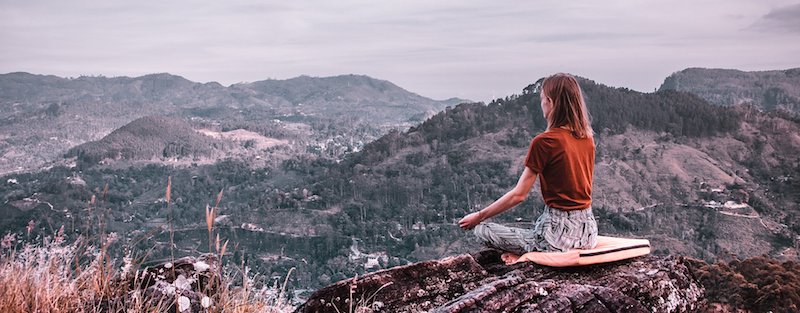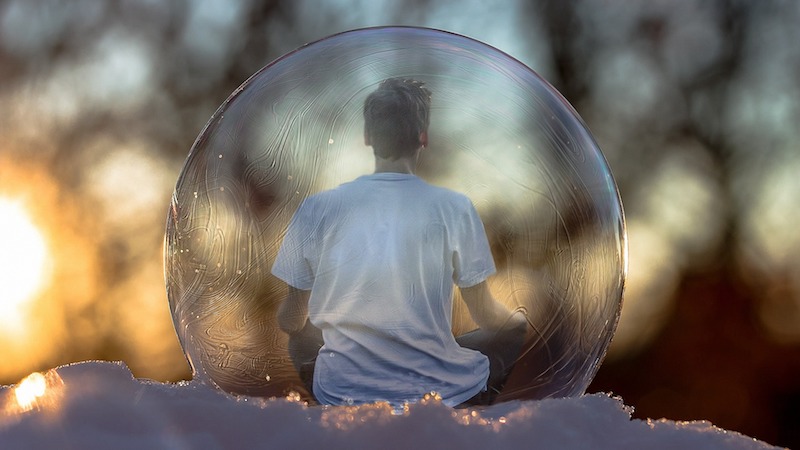Seated meditation, yoga postures (asanas), and breathing techniques (pranayama) may help treat or prevent infection with the coronavirus that causes COVID-19, and reduce the severity of the disease, suggest the authors of a new commentary.
The authors reviewed existing research on these traditional practices that shows their potential to reduce inflammation, boost the immune system, and help the body fight viral infection.
They emphasize that none of these practices have been tested against COVID-19. All of the ideas that they suggest in the paper “must be put to further rigorous scientific investigation,” they write.
However, given the urgent need to find effective treatments for COVID-19, they add that there is sufficient scientific evidence showing the benefits of these practices to warrant additional research.
As of July 21, over 14.7 million people have been infected worldwide with the coronavirus and over 611,000 people have died from COVID-19, according to the Johns Hopkins University Coronavirus Resource Center.
The commentary was published July 14 in The Journal of Alternative and Complementary Medicine.
The authors included William Bushell, Ph.D. a research affiliate in the department of anthropology at the Massachusetts Institute of Technology (MIT); Dr. Deepak Chopra, author and alternative-medicine advocate; Rudolph Tanzi, PhD, vice-chair of neurology and director of the Genetics and Aging Research Unit at Massachusetts General Hospital; and Kimberly Brouwer, PhD professor and infectious disease epidemiologist at UC San Diego; and others.
Anti-inflammatory benefits of meditation and yoga
While SARS-CoV-2, the virus that causes COVID-19, infects the lungs and causes respiratory symptoms like cough and difficulty breathing, the virus can also damage a number of other organs, including the heart, kidneys, stomach and intestines, and blood vessels.
This damage is not all caused by the virus directly, but by the body’s excessive inflammatory response to the virus, what’s known as a “cytokine storm,” named after one of the molecules involved in causing inflammation.
Inflammation is a normal response of the body to injury or infection, helping to heal the tissues. But chronic inflammation has been linked to a number of diseases such as stroke, heart disease, cancer, obesity, and diabetes.
Scientists also think that some people infected with the coronavirus develop a runaway inflammatory response that ends up harming tissues and organs throughout the body. Clinical trials are underway around the world to see if anti-inflammatory medications can reduce the severity of COVID-19 and help keep patients off ventilators.
Several studies have found that meditation and yoga can reduce this kind of inflammation in the body, along with offering other benefits, including:
- Six weeks of mindfulness meditation for 20 minutes a day reduced proinflammatory gene activity and inflammatory signaling, and increased anti-inflammatory chemicals in the body. This study involved women diagnosed with early-stage breast cancer.
- A 90-minute asana practice increased the expression of two molecules with antimicrobial properties in healthy adults.
- Six days of a combined practice of mantra-based meditation and asanas regulated the levels of a proinflammatory molecule (cytokine) and reduced the activity of pro-inflammatory genes. This study involved women who attended a yoga/meditation retreat; researchers compared them to women who stayed at the center but didn’t participate in the retreat.
Bushell and colleagues also compared the size of the anti-inflammatory effects of meditation and yoga that was seen in the studies they reviewed to the amount of inflammation seen in studies of patients with COVID-19.
“It is evident that effect sizes are larger with COVID-19,” they write. But they added that because meditation and yoga reduce some of the same cytokines that are increased during COVID-19, there is potential for these practices to help reduce inflammation related to COVID-19.
Potential effects of meditation and yoga on melatonin
Melatonin is a natural hormone produced by the pineal gland, a pea-sized gland located just above the middle of your brain.
It is best known for its role in sleep, with melatonin levels increasing at night (in darkness) and decreasing during the day (when it’s light). The rise in melatonin levels which starts at sunset helps you fall asleep. When melatonin production is disrupted — such as when people are exposed to too much artificial light in the evening — sleep can also be disrupted.
Melatonin also has proinflammatory and anti-inflammatory properties. The proinflammatory activity is thought to help the body fight invading pathogens such as viruses and bacteria. The anti-inflammatory actions of melatonin involve many chemical pathways in the body, including reducing the level of molecules that promote inflammation and increasing the level of cytokines that reduce inflammation.
Other researchers have suggested that melatonin may work as a treatment for COVID-19 alongside other treatments. Clinical studies would need to be done to show if this is true.
However, some studies in rats and mice have shown that melatonin can relieve the acute respiratory stress caused by infection with certain viruses and bacteria. Melatonin has also been suggested as a potential treatment for other viral infections, including Venezuelan equine encephalomyelitis and Ebola.
So how do meditation and yoga fit in?
Some research shows that these practices are linked to increases in melatonin. In one study, healthy men who did yoga asanas, pranayama, and meditation for three months had higher levels of melatonin, compared to people who did flexibility exercises, slow running, and playing games. The yoga group also saw improvements in their cardiovascular and mental health.
The men in this study practiced yoga regularly, with both a morning and evening practice, which consisted of:
- Morning: 45 minutes of asanas, followed by 15 minutes of pranayama
- Evening: 15 minutes of asanas, 15 minutes of pranayama, 30 minutes of meditation

Mental health benefits of meditation and yoga
I’ve written previously about the positive effects of meditation and yoga on mental health during the COVID-19 pandemic. I have also used my personal meditation and yoga practice to help me get through the past four months of lockdowns, coronavirus news overload, and being physically cut off from friends and family. So I’m not surprised that Bushell and colleagues would focus on this benefit of meditation and yoga.
“Relevant to the COVID-19 pandemic are the documented effects of some complementary practices, even potentially for novice practitioners, on reducing the severity of psychological stressors, including social isolation,” they write.
They also point out that the stress related to the COVID-19 pandemic has come in many forms, including threats to health, economic survival, personal relationships, and “normal life” itself.
“These kinds of extreme chronic stressors are known to be capable of leading to an overwhelmed immune system,” they write, which can impair a person’s immune response to an infectious agent like the coronavirus. Some research shows that acute psychological stress can cause an increase in proinflammatory molecules in the body.
Research also shows that meditation and yoga may be able to counteract some of the effects of psychological stress, including:
- Meditation can have a positive impact on depressed mood, anxiety, and quality of life.
- Loving kindness and compassion meditation practices could possibly counteract some of the negative effects of the pandemic by strengthening a sense of social connectedness, boosting positive emotions, and reducing distress.
- Greater positive mood has been linked to lower levels of virus in the blood in women with HIV.
Interesting, but more research is needed
The COVID-19 pandemic will likely continue for many more months, until a safe and effective vaccine is developed (which could be at least 12 to 18 months from now … or never). This situation has forced countries to cast a wide net in search of treatments that will work against the coronavirus.
This search is leaving no stone unturned, with some scientists looking to meditation and yoga as possible tools in the fight against the coronavirus.
“There is evidence of stress and inflammation modulation, and also preliminary evidence for possible forms of immune system enhancement, accompanying the practice of certain forms of meditation, yoga, and pranayama,” write Bushell and colleagues.
They add that the potential benefits of these practices include both short-term ones aimed at helping people with COVID-19 and long-term benefits aimed at reducing future health problems related to the disease.
As interesting as their ideas are, so far no clinical study has looked at whether meditation and yoga can help prevent coronavirus infection or be used to treat people with COVID-19. Until those studies are done, people should continue to follow the advice of their doctor and public health agencies such as The Centers for Disease Control and Prevention.
This includes taking steps to slow the spread of the coronavirus — which will protect those most at risk from COVID-19 — including:
- social distancing (staying at least six feet from people outside your household or social bubble)
- wearing a cloth mask when in public and social distancing is not possible
- washing your hands regularly and especially before touching your face
- self-isolating if you have symptoms of COVID-19 or have come into close contact with someone with a known or suspected case of COVID-19
- remembering that these actions are currently the best defense we have against the coronavirus
That said, meditation and yoga have many proven health benefits, including both physical and mental. If you already have a meditation or yoga practice, I recommend trying to stick with it throughout the pandemic. This is not always easy, but I find that a regular practice — even just five minutes a day — is most helpful during stressful times.
If you haven’t done meditation and yoga before, now is a good time to start, especially if you are stuck at home more often these days. There are many different types of meditation and yoga that can help you weather these stressful times. It’s important, though, to find a practice that fits your personality and your schedule. That will help you be consistent with your practice, which will provide you with the best results.
“Things falling apart is a kind of testing and also a kind of healing. We think that the point is to pass the test or to overcome the problem, but the truth is that things don’t really get solved. They come together and they fall apart. Then they come together again and fall apart again. It’s just like that. The healing comes from letting there be room for all of this to happen: room for grief, for relief, for misery, for joy.”
― Pema Chödrön, When Things Fall Apart: Heart Advice for Difficult Times


